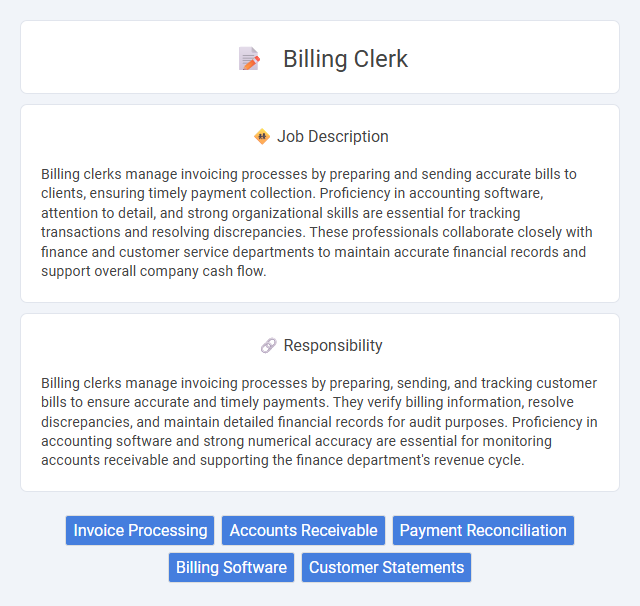
Billing clerks manage invoicing processes by preparing and sending accurate bills to clients, ensuring timely payment collection. Proficiency in accounting software, attention to detail, and strong organizational skills are essential for tracking transactions and resolving discrepancies. These professionals collaborate closely with finance and customer service departments to maintain accurate financial records and support overall company cash flow.
Individuals who are detail-oriented and comfortable working with numbers are likely to thrive as billing clerks. Those with strong organizational skills and the ability to maintain accuracy under repetitive tasks may find this job suitable. People who prefer structured environments and consistent routines probably have a higher chance of success in billing clerk positions.
Qualification
A Billing Clerk must possess strong numerical skills and proficiency in accounting software such as QuickBooks or SAP, ensuring accurate invoice generation and payment tracking. Attention to detail and experience with data entry are essential to minimize errors and support financial record-keeping. Knowledge of billing procedures, customer service skills, and basic understanding of financial regulations contribute significantly to the role's effectiveness.
Responsibility
Billing clerks manage invoicing processes by preparing, sending, and tracking customer bills to ensure accurate and timely payments. They verify billing information, resolve discrepancies, and maintain detailed financial records for audit purposes. Proficiency in accounting software and strong numerical accuracy are essential for monitoring accounts receivable and supporting the finance department's revenue cycle.
Benefit
A billing clerk job likely offers benefits such as health insurance, paid time off, and retirement plans, which can provide financial security and peace of mind. Opportunities for flexible work schedules and professional development may also be available, enhancing job satisfaction. These benefits probably contribute to a stable and supportive work environment.
Challenge
The billing clerk role likely involves managing complex invoicing systems that require high accuracy and attention to detail to avoid costly errors. Challenges may arise from handling discrepancies in billing data and ensuring timely processing of customer payments through various platforms. Adapting to evolving financial software and staying updated with regulatory billing standards is probably essential for success in this position.
Career Advancement
A billing clerk plays a crucial role in managing invoices, processing payments, and maintaining accurate financial records, which builds a solid foundation in accounting and finance principles. Gaining proficiency in billing software, data entry accuracy, and regulatory compliance opens pathways to positions such as accounts receivable specialist, payroll coordinator, or financial analyst. Developing analytical skills and pursuing certifications like Certified Billing Specialist (CBS) or Certified Public Accountant (CPA) further accelerate career advancement within corporate finance or healthcare reimbursement sectors.
Key Terms
Invoice Processing
Billing clerks specialize in invoice processing, ensuring accurate entry, verification, and timely distribution of billing documents. They manage accounts receivable by reconciling discrepancies and maintaining detailed records using accounting software like QuickBooks or SAP. Efficient invoice processing by billing clerks supports cash flow management and improves financial reporting accuracy.
Accounts Receivable
Billing clerks specializing in Accounts Receivable manage invoicing, payment processing, and reconciliation of customer accounts to ensure accurate financial records. They track outstanding payments, generate detailed reports on account status, and coordinate with clients to resolve billing discrepancies efficiently. Proficiency in accounting software and strong attention to detail are critical for optimizing cash flow and maintaining up-to-date receivable ledgers.
Payment Reconciliation
A Billing Clerk specializing in Payment Reconciliation ensures the accuracy of customer account records by matching payments received against outstanding invoices. This role involves analyzing payment discrepancies, processing adjustments, and updating billing systems to maintain precise financial data. Expertise in accounting software and attention to detail are critical for resolving payment variances and supporting overall accounts receivable efficiency.
Billing Software
Billing clerks use specialized billing software such as QuickBooks, FreshBooks, and SAP to generate accurate invoices and process payments efficiently. Expertise in billing software streamlines the management of accounts receivable, reduces human errors, and enhances financial reporting accuracy. Proficient billing clerks integrate software tools to ensure timely billing cycles and maintain detailed transaction records for audit purposes.
Customer Statements
Billing clerks generate accurate customer statements by reviewing account transactions and verifying billing information. They ensure timely delivery of statements to clients, facilitating prompt payment and resolving discrepancies efficiently. Maintaining detailed records, billing clerks improve cash flow management and contribute to overall financial accuracy.
 kuljobs.com
kuljobs.com